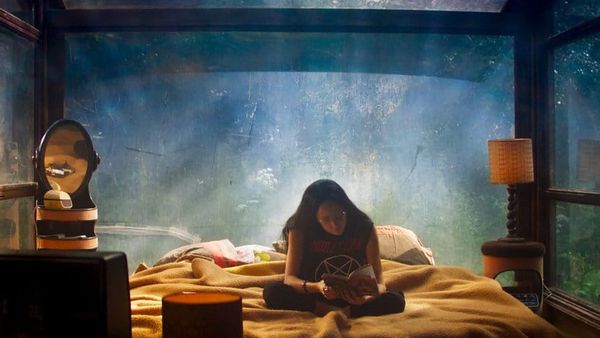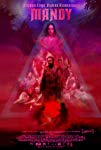Eye For Film >> Movies >> Mandy (2018) Film Review
Mandy
Reviewed by: Owen Van Spall

As much as I enjoyed Beyond The Black Rainbow director Panos Cosmatos’s new exercise is a perverse and very self-aware mashup of Giallo, horror novel and metal album cover art, Hellraiser and the photography of Gregory Crewdson (among many, many other things). His surreal and blood-drenched 'midnight movie’ Mandy represents the problems of promising audiences something along the lines of ‘the most unhinged Nicholas Cage performance of all time’.
Cage at this point in his career is veering between straight-to-video crud and the occasional eyebrow-raising indie film, and his ‘unique’ acting approach (to me Cage is perhaps better than anyone at using his entire face to express a person at war with himself) has earned him legions of fans and turned him into a never-ending meme factory. Given all that, his presence here, combined with the director’s singularly weird vision, has already set fans up for a treat unlike any other. We are promised all kinds of Cage-specific insanity; the gurning, the eye-bulging deliveries of overblown dialogue, and deliverance of justice with a vicious-looking axe to some demon scum. That is a lot to deliver on. But the film only lives up to about 80% of the promise whereas I wanted 150%.

That is not to say Cage doesn’t deliver some ‘classic Cage’ moments in Mandy, which range from taking on a seedy-looking cultist in a chainsaw duel, to breaking the neck of an LSD-mutated armoured biker in a cabin living room and then juicing himself up with coke snorted off the shards of the broken TV screen. Given the kind of audience this film is going to attract, expect plenty of whooping and ‘fuck yeahs!’ to ring around the auditorium. Cage plays American lumberjack Red Miller, who comes off initially as one of the many sad-sack types Cage has played before in both straight and comic turns; a shaggy plaid-wearing and soft-spoken dude with a doe-eyed look we know will slowly give way to the wide-eyed, gawping madman as things spiral out of control.
It is 1983, some ornate chapter text tells us in a slow credit sequence of a timber yard set to King Crimson’s gorgeous song Starless, and Red is living with his lover who the film takes its title from - Mandy - in a mountain-cabin idyll that features an ‘all windows’ transparent aesthetic that gives you the sense that an artist designed it. Maybe Mandy was that artist, as we see her painting and sketching quite often before the shit hits the fan. Mandy and Red seems like the proverbial chalk and cheese as a couple; he seems content with a beer and a TV dinner after a shift, while Mandy is into books about horror mythology, rocks faded Motley Crue tees, and seems to drift rather than walk. Andrea Riseborough makes Mandy a memorably unearthly character: pale skin, huge eyes, and an air of being on another wavelength to everyone else.
But it is the fate of her character to die pretty early on at the hands of a ragtag band of Satanic cultists who invade their humble abode with the aid of a mysterious deformed biker gang - in what is a pretty straightforward plot designed to hang a boatload of stylistic colour-saturated flourishes and various homages to pop and niche culture on. The bikers look like extras from Hellraiser and appear backlit with spotlights when posing among the ferns surrounding Red and Mandy’s cabin, making it hard to see their features clearly; a simple but neat visual trick. The vainglorious cult leader dishes out LSD to his followers and tries to hook Mandy in with both a shot of his product and a very long speech, one of several sequences that end up meandering way past the point the various sonic and visual flashes (scratchy soundtrack distortions, trippy motion blurring tracer effects, and lots of vivid, giallo-type lighting) have hit peak impact.
Mandy is never boring to look at or listen to, with late composer Jóhann Jóhannsson giving us a dense and hallucinatory medley of extreme sounds that draw on black metal, menacing ambient, doom drone, and piercing orchestrations. The production design and cinematography offer chilly bleak canyons through to spooky A-frame churches, usually with some hellish sky roiling overhead. The net affect is to create quite a potent sense of some kind of hell spilling over and puling the real world back down with it, and adds to the unhinged nature of Red’s braincase.
But when Cage finally gets on his revenge path, the movie fumbles the pass a little in terms of the promised payoff by giving us clumsily constructed fight sequences that are often too dark to make out clearly (though they tend to have a ghoulishly fun end point), and there are a few too many overlong scenes that add very little to the story or allow Cage to let rip. Yes, I like being kept waiting for my pleasures, but at least ten minutes of this film could’ve been shaved off by trimming the endless beats where Cage just stares out at the audience while waiting for a weird offscreen character to do something. Still, even in those draggy moments, usually something viscerally eye-popping has just flashed by onscreen and you will still be dealing with the afterimage burned onto your retina, and that Jóhannsson score (his last, sadly) will be keeping your bones shaking.
Reviewed on: 08 Oct 2018

















